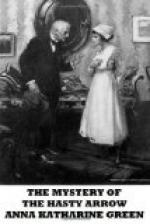“See what?” urged the Curator with an accent one might almost call tender—would have been called tender, if used in addressing a woman.
“See her, that dead girl!—constantly—at night when my eyes are shut—in the daytime while I go about my affairs, here, there and everywhere. The young, young face! so white, so still, so strangely and so unaccountably familiar! Do you feel the same? Did she remind you of anyone we know? I grow old trying to place her. I can say this to you; but not to another soul could I speak of what has become to me a sort of blind obsession. She was a stranger. I know of no Madame Duclos and am sure that I never saw her young daughter before; and yet I have started up in my bed more than once during these past few nights, confident that in another moment memory would supply the clue which will rid my mind of the eternal question as to where I have seen a face like hers before? But memory fails to answer; and the struggle, momentarily interrupted, begins again, to the destruction of my peace and comfort.”
“Odd! but you must rid yourself of what unnerves you so completely. It does no good and only adds to regrets which are poignant enough in themselves.”
“That is true; but—stop a minute. I see it now—her face, I mean. It comes between me and the house there. Even your presence does not dispel it. It is—no, it’s gone again. Let us go back once more and take another look at the sea. It is the one thing which draws me away from this pursuing vision.”
They resumed their stroll, this time away from the house and toward the oval cut in the trees for a straight view out to the sea. Across this oval a ship was now sailing which attracted the eyes of both; not till it had passed, did the Curator say:
“You live too lonely a life. You should seek change—recreation—possibly something more absorbing than either.”
“You mean marriage?”
“Yes, Roberts, I do. Pardon me; I want to see your eye beam again with contentment. The loss of your late companion has left you desolate, more desolate than you have been willing to acknowledge. You cannot replace her——”
“I am wedded to politics.”
“An untrustworthy jade. When did politics ever make a man happy?”
“Happy!” They were turned toward the house again. When near, Roberts capped his exclamation with the remark:
“You ask a great deal for me, more than you ask for yourself. You have not married again.”
“But my mistress is not a jade. I find joy in my work. I have not had time to woo a woman as she should be wooed if she’s to be a happy second wife. I should have so much to explain to her. When I get looking over prints, the dinner-bell might ring a dozen times without my hearing it. A letter from an agent telling of some wonderful find in Mesopotamia would make me forget whether my wife’s hair were brown or black. I don’t need diversion, Roberts.”




